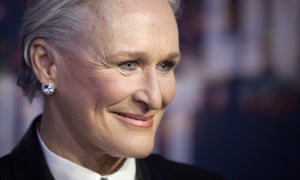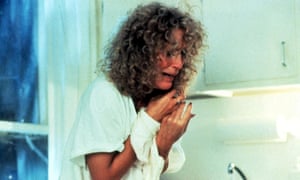
You may have little room left for outrage at the moment, but please spare a quiet scream for Glenn Close who has – ready for it – never won an Oscar. The 70-year-old actor has accrued six nominations during an illustrious career, yet for every “Poor Leo” meme that followed each of Leonardo DiCaprio’s losses, we haven’t witnessed a similar online campaign to propel Close to the stage of the Dolby theatre. As it stands, she holds the record for the living actor with the most nominations without a win. But, as she begins a new decade, it looks like her chance for a statuette may have finally arrived.
In the electrifying 90s-set drama The Wife, she stars as a woman married to a distinguished author (a never-better Jonathan Pryce) poised to accept the Nobel prize for literature. Her own writing career, once seen as so promising (we learn this via a series of flashbacks starring Close’s daughter Annie Starke as her younger self), ended early so she could support her husband and raise a family. But as the pair head to Sweden to accept his medal, tensions begin to boil and a woman who has spent years in the shadows is ready to come into the light.
The Wife is about marital secrets, sacrifice and also – in a fantastically performed opening scene – it’s about what sex means for those over the age of 60. “I think people don’t realise that you keep your sexuality up until you die,” Close tells me, as we share a near-conspiratorial chat in the lounge of the Ritz Carlton hotel. “I think it’s good for kids to see it. That scene is kind of funny and real, and Jonathan was just so wonderful to work with.”
It’s a sensational, thrilling turn from Close and in a career filled with fine work, it may well be her best yet. The film, still awaiting UK and US distribution, premiered at this year’s Toronto film festival, a fertile breeding ground for awards hopefuls and she seems gratified by the buzz that it’s receiving. It is a role that she is effortlessly suited for, but in reality, Close, who has been married three times, has never lived in the shadow of a spouse; instead, she has often been the one on the other side of the equation.
“I think it’s difficult,” she says. “I don’t think the male ego is necessarily conducive to having a really successful and recognisable partner. I think it can be hard and I now accept that!” She laughs and tells me about a Harvard study that showed both men and women tend to warm more to female figures who are more traditionally feminine and nurturing. It’s not a fact that Close has paid much attention to, though, her career typified by characters who refuse to comply with old-fashioned gender conventions. She played a ruthless lawyer on the small screen in Damages; a manipulative widow in Dangerous Liaisons; a dog-killing fashionista in 101 Dalmatians; a strong-willed vice-president in Air Force One; and bunny-boiling lover Alex Forrest in Fatal Attraction – none of whom were ever stuck in the kitchen playing house. “I’ve played a lot of women that people have called bitchy or evil,” she says. “They have been incredibly strong and it’s just interesting to me because the parts I’ve played in my career have been labelled as if they were women in the workplace.”
Her most recognisable role to date remains Forrest, the woman who single-handedly scared male cinemagoers off having affairs in the late 80s. It’s a flooring performance, but while Forrest became known as one of cinema’s all-time greatest villains, to Close she remains a misunderstood figure.
“That character had a lot of secrets,” she says. “But there’s no way for the audience to know what her past was. It’s only hinted at when she looks at him giving the bunny to his daughter and then throws up in the bushes. Nobody would say: well why did that happen? Whereas I asked that and the psychiatrist said if she was molested at an early age, and what she was made to do made her gag and throw up, then that’s her trigger. Someone who’s been abused like that has absolutely no self. I mean, there’s a hatred for one’s self because you’re made to be a sexual object way before you’re ready. When the new ending came, it gave a catharsis to the audience but that kind of made her into a psychopath.”
Fatal Attraction made Close a household name and provided her with a fourth Oscar nomination, but despite a decade filled with hits, she felt was not always awarded the respect she deserved behind the scenes. We discuss the casting process and the horrors that often greet female actors along the way. She offers a “demeaning” anecdote of an actor who inappropriately touched her thigh (“I did feel there was a collusion between him and the director”) but goes on to recount a far more troubling story.
“I was asked to come in and read with an actor who was huge at the time and I walked in and there was a bed,” she tells me. “I had the pages with me, but he didn’t know any of his lines and didn’t have them with him. So it was horrible. I realised afterwards that it was like putting a dog in with a bitch to see if he wanted to jump on her. If I had just forgotten the lines and worked at seducing him then I probably would have gotten the part.”
Playing the game, whatever that might be at any given point, has never been of interest to Close. She has never lived in Los Angeles, has avoided industry schmoozing (“Maybe I should have gone to more parties, but I hate parties!”) and worked on films that tested her versatility rather than increased her bank balance. She also remains outspoken on issues such as mental health, LGBTQ rights, abortion and her outrage over Donald Trump’s presidency.
“It’s so dangerous because [Trump is] creating these diversions and meanwhile all his people are deconstructing vital things for our country in every single area,” she says with visible frustration. “These are bad people; why would you do these things unless you just want to get richer? It’s mind-boggling to me. I think the scary thing is we’ll all get to a point when you just don’t want to hear about it any more and that’s the danger. I know who my representatives are and I think the best thing to do is just calmly write letters, write letters, write letters. You can’t just scream and say this is awful; you have to very quietly say: ‘Well let’s get rid of him.’”
Close’s commitment to wider social change remains a constant in her life, alongside a tireless work ethic that, in the past year, has seen her shooting an Amazon pilot (“A character like I’ve never played before”); playing a villain in the dystopian Netflix thriller What Happened to Monday; taking on parts in comedies Bastards and The Wilde Wedding; and reprising her role as Norma Desmond in the Broadway musical version of Sunset Boulevard. The latter is a character who remains dear to her and one that she’s set to take on again in a new big-screen adaptation. “We’re waiting for the final contracts to be signed and it’s pretty hairy!” she says. “I hear from my agent closer, closer; and I hear from the director who wants to do it, closer closer. It’s a profound story and has huge resonance today.”
While Close’s packed career is in no need of an added validation, an Oscar would still prove to be an appreciated, and unexpected, cherry on top. “I’ve always felt like I’m an outsider looking in and I guess that’s why something like an Oscar would mean a lot because of that feeling,” she tells me. “It’s the most valued recognition you can get, certainly in film, and having been doing it for so long, it would mean a lot to me.”
The downside? All those parties …
The Wife is screening at the Toronto film festival; a UK release date is yet to be confirmed


No comments:
Post a Comment